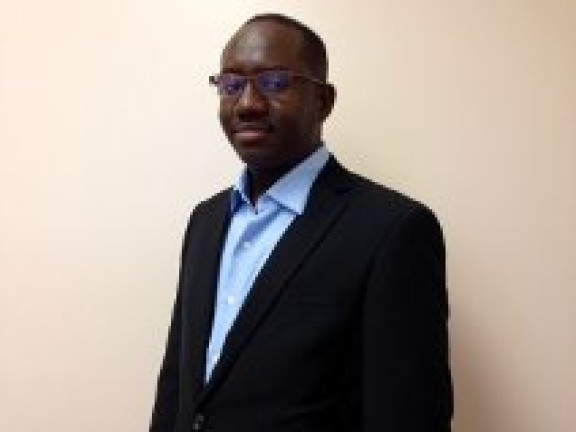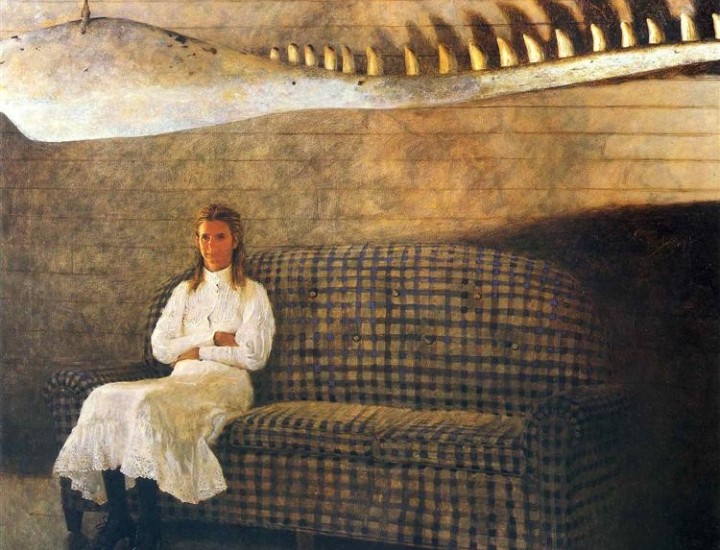"Without NSC, I can't imagine how my life would be"

I feel safe and welcome. That’s a great feeling for me.
Omer Tiben doesn’t fit the typical profile of a Nationalities Service Center donor. His story is a client’s tale of life turned upside-down by turmoil in his homeland of Sudan, chaos so great and so threatening, Omer decided that to live he had to leave.
He is one of hundreds of refugees and asylum seekers on average served yearly by NSC.
Successful now in the United States, he sends part of the pay from his telecommunications technician job to his father and brothers in Sudan. He also has contributed to NSC. Even as he misses his family, he is at home in the United States.
“I feel safe and welcome,” he said. “That’s a great feeling for me.”
Omer became one of NSC’s beneficiaries soon after he came to the United States in 2012, settling in Philadelphia because a cousin lived in the city and had talked about the Sudanese community. He led a happy childhood in the North Darfur city of Al Fashir with his father, aunt, brothers and cousins. Those were the carefree days when families in all the homes looked out for each others’ children, when he and his friends played their favorite game – throwing balls at a tower of empty cans, then aiming the ball at members of the other team to get them out. Omer, now 31 and looking confident in a black suit and blue dress shirt, smiles as he describes that boyhood pastime.
Then came war in Darfur.
It started in the countryside in 2003 and quickly made its way to Al Fashir when rebels attacked the city. That was around the time, Omer said, he was about to take his final high school exam. He remembers the Friday when the violence came to town. He and his brother were alone at home.
“I was really scared that day. We heard shooting, people shooting, a lot of shooting,” he said. “Me and my brother started shouting and hid under the bed in our room.”
Finally, a neighbor came to check on them and took the brothers to her house.
The attack ended around 9 p.m., Omer said, and residents emerged from their homes to check at hospitals for loved ones and to gauge the damage. Omer went to the airport. He went to his high school. His alma mater was where his education began about war’s effects. For the first time, he saw burning skin and people bleeding after being shot.
“For the first time in my life I see dead bodies,” he said.
Bullet holes in the high school roof were minor damage compared to the human wounds, but they were emblematic of how war changed life in Darfur.
Omer recalls studying hard as the violence increased and factions stoked hatred of each other. “Everyone was trying to make every other ethnic group look like the enemy,” he said.
Still, he studied hard, passed the big high school exam, and attended college in the Sudanese capital of Khartoum, where he earned an associate’s degree in telecommunications. He returned to Al Fashir and was hired by the United Nations to set up communications equipment and infrastructure throughout Darfur. The money was good and the work was satisfying. Mostly.
The government, Omer said, seemed suspicious of him after he was a U.N. employee – especially after the international organization sent him to the United States for training. When he returned, security officers repeatedly accused Omer of meeting in the United States with government opponents. He routinely was stopped, questioned and told he was being watched.
About four months after he returned from the United States, “there was a knock on my door. When I opened it, there was a group of people with guns, some wearing military clothes. They began shooting and they took me … They put my head down, blindfolded me, kicked me with their boots, they tied my hands and feet.”
He was driven to a military compound, he recalled, where offices demanded that Omer tell them why he really had gone to the United States and what he had done there. They again accused him of working for the opposition, which Omer again denied. Still, they beat his hands and feet and threatened to kill him. “Really bad punishment, torture,” he said. “I thought I was going to die that day.”
After 14 hours, Omer was released. No longer feeling safe in his homeland, he decided to go to the United States.
The nine months he lived in his cousin’s basement were depressing ones. Even with his cousin and the Sudanese community helping him, he felt alone and struggled with flashbacks of his beating. He wanted to apply for asylum but couldn’t afford a lawyer to help him through the process. Finally, a fellow Sudanese encouraged him to go to the Nationalities Service Center. Omer went in and told workers his story. In a few days, they called him and said they would help him with his asylum application.
“I was really happy,” he said. “It was really good news for me.”
Omer attended English classes at NSC. Staff took him to a doctor to have his wounds treated, provided him with winter clothes and blankets, and gave him a SEPTA card. They taught him job-seeking skills. He was a good student, networking on his own with people in the telecommunications field. Last year, he got a job as a telecommunications technician. He began working this summer for a different company in a higher-paying job with more responsibilities.
He travels most of the time, but always comes back to Philadelphia, which he considers his American home. And NSC employees are his American family.
“To me, it’s a really great organization … it’s a motivation center,” he said. “They always make us feel like we’re one part of America. They always bring us closer to American life.”
“Without them here,” he said, “I can’t imagine how my life would be.”
